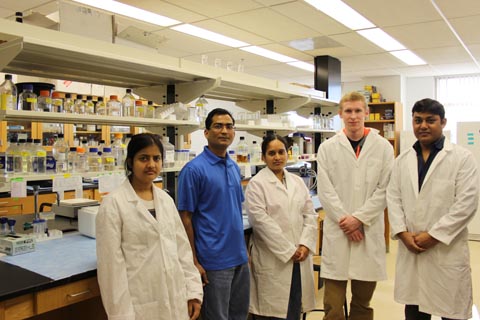 |
| Oakland University’s Chhabi Govind, Ph.D., is conducting groundbreaking research that could help prevent diseases linked to a defect in the DNA transcription process. Pictured: Dr. Priyanka Singh, post-doctoral fellow; Dr. Chhabi Govind; assistant professor of biological sciences and principal investigator of the grant; Bala Bharathi Burugula, Ph.D. student; Craig Yanuszeski, undergraduate student; and Dr. Rakesh Pathak, post-doctoral fellow. |
With a $1.37 million grant from the National Institute of General Medical Sciences, which is part of the National Institutes of Health, Oakland University’s Chhabi Govind, Ph.D., is conducting groundbreaking research that could help prevent diseases linked to a defect in the DNA transcription process. During transcription, DNA is copied into RNA by the enzyme RNA polymerase. This is the first step in gene expression, which is the process by which the information encoded in a gene is used to create gene products, such as proteins that control an organism’s shape and other characteristics.
The results of these studies were recently published in two separate papers, showing recruitment and function of important factors that regulate chromatin structure. One of the articles, “The RSC Complex localizes to coding sequences to regulate Pol II and histone occupancy,” was published in a top-tier scientific journal, “Molecular Cell.” According to its website, the journal highlights studies that report “novel results of unusual significance and of interest to researchers in the field.”
“We showed that the RSC (Chromatin Structure Remodeling) Complex is targeted to the protein coding region of the genes through interaction with the elongating RNA polymerase. Polymerase-associated RSC recognizes modified nucleosomes and dislodges them from the DNA and allows transcription machinery to pass through coding regions,” said Dr. Govind, assistant professor of biological sciences. “In addition to its role in disrupting chromatin structure, the RSC also helps in maintaining histone occupancy over the transcribed genes.”
This is the first study that shows a role for RSC in regulating elongation of RNA polymerase through nucleosome-rich regions in the cell. Along with the national exposure his work has received, Dr. Govind has also drawn praise from his colleagues at Oakland.
“Dr. Govind’s longstanding interest in the conditions that affect gene transcription led him to inquire how cells untangle the obstacle created by histone packaging,” said Dr. Arik Dvir, chair of the Department of Biological Sciences. “To address this question, he developed a very elegant experimental system that allowed him to study this process in intact cells. Dr. Govind’s approach has been successful and conclusive; it opened a window to understanding the conditions that govern this very fundamental process in our cells.”
In another study, Dr. Govind’s lab team delineated the molecular mechanism by which Spt6, a histone chaperone, interacts with the elongating polymerase to ensure reassembly of dislodged nucleosomes. The results of this study were published in the highly regarded journal “Molecular and Cellular Biology” under the title “Histone Deacetylases and Phosphorylated Polymerase II C-Terminal Domain Recruit Spt6 for Cotranscriptional Histone Reassembly.”
The packaging of DNA into chromatin allows genetic material to fit neatly into the nucleus of a cell. The disrupted chromatin structure in the wake of transcription is reset by histone chaperones. Dr. Govind’s research examined the molecular mechanism by which Spt6, a histone chaperone, travels with the elongating polymerase to ensure reassembly of dislodged nucleosomes. Inappropriate changes to chromatin structure often cause human diseases, including certain cancers. In the lab, Dr. Govind studies the dynamics of chromatin structure in budding yeast as a model organism.
“RSC is abundant and the only essential chromatin remodeler in yeast and mutations in the RSC complex in higher organisms, including humans, have been linked to cancer,” Dr. Govind said. “Understanding how various chromatin remodelers and histone chaperones act in coordination will allow us to identify the targets for therapeutic purposes.”
Dr. Govind constantly engages students in his research, including those at the undergraduate, master’s and Ph.D. levels. The members of his lab team (pictured with Dr. Govind) are Dr. Priyanka Singh, post-doctoral fellow; Bala Bharathi Burugula, Ph.D. student; Craig Yanuszeski, undergraduate student; and Dr. Rakesh Pathak, post-doctoral fellow.
To read the abstract of the article in “Molecular Cell,” visit
cell.com/molecular-cell/abstract/S1097-2765%2814%2900786-2
To read the full article in “Molecular and Cellular Biology” visit
mcb.asm.org/content/34/22/4115.full
To learn more about programs and research in OU’s Department of Biological Sciences, visit the
oakland.edu/biology.

